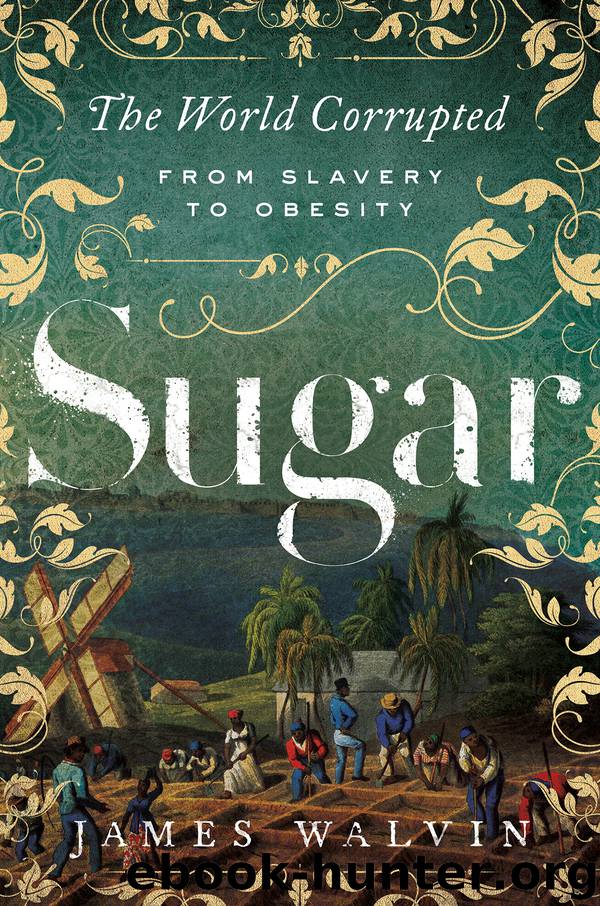Sugar by James Walvin

Author:James Walvin
Language: eng
Format: epub
Publisher: Pegasus Books
12
A Sweeter War and Peace
FOR CENTURIES, EUROPE’S slave empires had ensured that their metropolitan hinterlands would be avid consumers of sugar. When slavery vanished (in the British case, in a puff of self-righteous celebration), it left behind an unquenchable appetite for sweetness in all things. That taste continued to be sated by a changing mix of cane sugar from former slave colonies, from new tropical settlements, and from beet sugar yielded by Europe and America’s expanding beet industries. The British imported large volumes of German beet sugar, but that came to an immediate end with the outbreak of war in 1914.1
Sugar was big business in Britain itself, its importance visible enough in the form of refineries in many British port cities. London had been the home to Britain’s first sugar refineries, but the rapid expansion of the industry saw the proliferation of refineries at many of the country’s major ports – Liverpool, Bristol and Greenock – though the majority were in London. In 1851, for example, there were an estimated 1,200 ‘sugar refiners’ working in the city.2 But it was an industry which, like most others, changed in the nineteenth century with the rise of modern technology, which speeded up the process of refining cheap granulated sugar. Where it had once taken weeks to produce sugar loaves, now tons of granulated sugar spilled from London’s modern refineries in a matter of days.3 New machines also made possible the mass manufacture of a host of new sweets and chocolates. What had once been slow manual labour was now speedily dispatched by machines, as described by Henry Weatherley, a machine manufacturer, in 1865:
The large increase in the consumption of sweets, made from boiled sugars, in the UK during the last quarter of a century, has arisen principally from the cheapness and facility of manufacture, derived from the introduction of machinery . . .
Where it had once taken half an hour to make boiled sweets by hand, a machine now took a mere five minutes.4
Along with Hamburg, London had become a major trading centre for global sugar. The East End of London had been dotted with sugar refineries, mainly strung out along the river in Whitechapel and along the Commercial Road,5 but their numbers declined with the advance of sugar technology. In 1864, seventy-two British refineries processed 500,000 tons of sugar; by 1913 this had been reduced to thirteen refineries, but they were producing more than 1 million tons of sugar.6 The process of technological and scientific change transformed the food habits of Europe and North America after c.1850 and, as a result, millions of people turned to a new urban diet, all of which was discharged by modern machinery and delivered swiftly by new transport systems. Moreover, wherever we look, cheap granulated sugar lay at the heart of those industrial foodstuffs.7
Cheaply produced sugar and, from the mid-century, an era of free trade enabled sugar to consolidate its position as a central ingredient in the British diet. In 1810, the annual per capita consumption of sugar in the UK was 18lb.
Download
This site does not store any files on its server. We only index and link to content provided by other sites. Please contact the content providers to delete copyright contents if any and email us, we'll remove relevant links or contents immediately.
Craft Beer for the Homebrewer by Michael Agnew(17461)
Marijuana Grower's Handbook by Ed Rosenthal(3122)
Barkskins by Annie Proulx(2884)
Project Animal Farm: An Accidental Journey into the Secret World of Farming and the Truth About Our Food by Sonia Faruqi(2667)
Red Famine: Stalin's War on Ukraine by Anne Applebaum(2467)
The Plant Messiah by Carlos Magdalena(2458)
Organic Mushroom Farming and Mycoremediation by Tradd Cotter(2313)
0041152001443424520 .pdf by Unknown(2228)
In the Woods by Tana French(2005)
Beer is proof God loves us by Charles W. Bamforth(1935)
The Art of Making Gelato by Morgan Morano(1901)
Meathooked by Marta Zaraska(1893)
Birds, Beasts and Relatives by Gerald Durrell(1869)
Reservoir 13 by Jon McGregor(1856)
The 7 Habits of Highly Effective People: Powerful Lessons in Personal Change (25th Anniversary Edition) by Covey Stephen R(1839)
Borders by unknow(1790)
The Lean Farm Guide to Growing Vegetables: More In-Depth Lean Techniques for Efficient Organic Production by Ben Hartman(1789)
The 7 Habits of Highly Effective People: Powerful Lessons in Personal Change by Stephen R. Covey(1767)
Urban Farming by Thomas Fox(1751)
